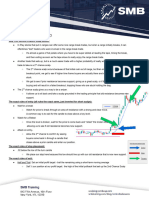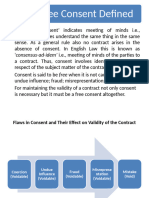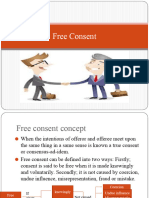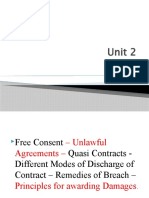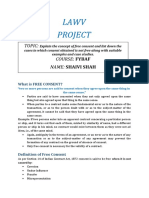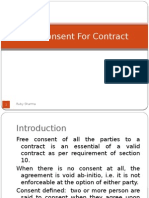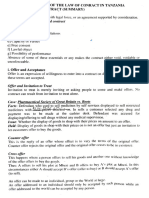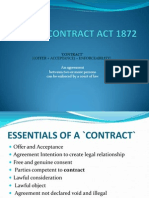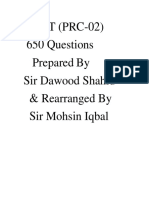Free Consent: Coercion
Free Consent: Coercion
Uploaded by
Zeeshan BakaliCopyright:
Available Formats
Free Consent: Coercion
Free Consent: Coercion
Uploaded by
Zeeshan BakaliOriginal Title
Copyright
Available Formats
Share this document
Did you find this document useful?
Is this content inappropriate?
Copyright:
Available Formats
Free Consent: Coercion
Free Consent: Coercion
Uploaded by
Zeeshan BakaliCopyright:
Available Formats
CAF - Mercantile Law Knowledge Base
Free Consent (Consensus-ad-idem)
In between contracting parties, Contract Act 1872 requires that parties must have consent towards the contract.
'Two persons are said to have consent when they agree upon the same thing in the same sense.'
The effect of absence of consent is that the agreement is not valid (void) and is not enforceable by law.
Following actions are held to give the consent away in a contract;
1. Coercion
2. Undue influence
3. Fraud
4. Misrepresentation
5. Mistake
Coercion
Coercion is the:
1. committing or
2. threatening to commit any act
which is forbidden by Pakistan Penal Code or
1. unlawful detaining or
2. threatening to detain,
Any property with an intention of causing any person to enter into an agreement.
Example
A puts a pistol on B's temple and compels him to sell his bike, worth Rs. 80,000, for only Rs. 8,000. Here, B’s consent
has been obtained by coercion because threating someone of killing is an offense under the Pakistan Penal Code.
Parties to coercion
Coercion may be exercised from any person, and may be directed against any person, even a stranger.
Example
A threatens B of murdering C (B's Son), either himself or through the use of another person, D, a gangster.
Effects of coercion
1. The contract becomes voidable at the option of the party whose consent was so caused. The burden of proof
lies on the party who rescinds the contract.
2. The party rescinding the contract shall, if he has received any benefit from another party, restore such
benefit (i.e. restitution.)
Prepared by Sir Uzair Fatmi
CAF - Mercantile Law Knowledge Base
Undue influence
A contract is said to be induced by undue influence where the relations subsisting between the parties are such that
one of the parties is in a position to dominate the will of the other and uses that position to obtain unfair advantage
over the other.
The nature of relationship between parties is significant if undue influence is to be inferred.
Nature of relationship
A person is in a position to dominate the will of another where he:
holds the real or apparent authority over the other e.g. parent and child stands in a fiduciary relation to the other
e.g. already indebted makes a contract with a person whose mental capacity is temporarily or permanently affected
by reason of age, illness or mental or bodily distress e.g. medical attendant and patient.
Relationship presumptions
In the following relationships it is presumed (rebuttably) that a person is in a position to dominate the will of another
person:
1. Father and son
2. Guardian and ward
3. Employer and Employee
4. Trustee and beneficiary
5. Teacher and student
6. Doctor and patient
7. Solicitor and client
8. Fiancé and fiancée
9. Pardanasheen lady (Completely secluded)
In the following relationship there is no (rebuttable) presumption that a person is in a position to dominate the will of
another person:
1. Landlord and tenant
2. Creditor and debtor
3. Husband and wife (non parda observing)
Effect of undue influence
The contract becomes voidable at the option of the party whose consent was so caused. The burden of proof is on
the party who was in a position to dominate the will of the other party not all cases.
Example
A man enfeebled by a disease which can be cured through medication, is induced, by influence over him of his
doctor, to agree to surgical cure so the doctor could earn unreasonably large sum & credibility. The doctor has
employed undue influence over his patient.
Prepared by Sir Uzair Fatmi
CAF - Mercantile Law Knowledge Base
Fraud
Fraud means and includes any act committed by a party to a contract (or with his connivance or by his agent) with
intent to deceive another (party to it or his agent), or to induce to enter into a contract through following acts;
1. False assertion
The suggestion, as a fact, which is not true, by one who does not believe it to be true.
Example:
A sells to B locally manufactured goods representing them to be imported goods charging a higher price, it
amounts to fraud.
2. Active concealment
The active concealment of a fact by one having knowledge or belief of the fact such as, where steps are taken
by a seller concealing some material facts so that the buyer even after a reasonable examination cannot
trace the defects, it will amount to fraud
Example:
Z a furniture dealer conceals the cracks in furniture sold by him by using some packing material and polishing
it in such a way that the buyer even after reasonable examination cannot trace the defect, it would amounts
to fraud.
3. Empty promise
A promise made without any intention of performing it constitutes to fraud.
Example:
Buying goods under a contract of sale with an intention of not paying the price is fraud.
4. Declared act
Any such act or omission as the law specially declares to be fraudulent.
5. Fitted act
Any other act fitted to deceive.
Rules for fraud
The underlying rules of fraud are given below:
1. Party to a contract
The fraud must be committed by a party to a contract or by anyone with his connivance or by his agent. Thus,
the fraud by a stranger to the contract does not affect its validity.
2. Representation as to fact
A mere opinion does not amount to fraud. A representation must relate to a fact than it amount to fraud.
3. Actually deceived
A deceit, which does not deceive is not fraud. The fraud must have actually deceived the other party who has
acted on the basis of such representation.
4. Suffered loss
Loss has been suffered by the party who acted on the representation.
5. Silence
Mere silence as to facts likely to affect the willingness of a person to enter into a contract is not fraud, unless
the circumstances of the case are such that parties stands in fiduciary relationship or where silence itself is
equivalent to speech.
Prepared by Sir Uzair Fatmi
CAF - Mercantile Law Knowledge Base
Effects of fraud
The effects of fraud are as follows;
1. The contract becomes voidable at the option of the party whose consent was so caused.
2. The party whose consent was so caused may insist on performance of the contract.
3. The party whose consent was so caused is entitled to claim damages.
Exceptions to rescind the contract
A party cannot rescind the contract where:
1. Silence amounts to fraud and the aggrieved party had the means of discovering the truth with ordinary
diligence
2. The party gave the consent in ignorance of fraud
3. The party after becoming aware of the fraud takes a benefit under the contract
4. An innocent third party before the contract is rescinded acquires some rights in good faith in the property
passing under the contract.
5. The parties cannot be restored to their original position.
Misrepresentation
Misrepresentation is the giving of false information by one party (or her or his agent) to the other before the contract
is made, which induces them to make the contract. It includes;
1. Unwarranted statement
When a person makes a positive statement of fact and believes it to be true when his information does not
warrant it to be so, amounts to 'negligent misrepresentation'.
Example: A sold B some goods, claiming them to be 1 st grade quality as A believes but he didn't satisfied
himself with evidence for such declaration. Later B discovered that the goods where 3 rd grade quality.
2. Breach of duty
Any breach of duty which ;
• without an intent to deceive,
• gains an advantage to the person committing it, or
• anyone claiming under him,
• by misleading another
• to his prejudice or
• to the prejudice of anyone claiming under him.
Example: A handed over a picture to an agent, B for sale. B knew of the picture's true worth yet bought it for
a considerably lower price, telling A that there is not going to be a substantial price for it in the market. This
amounts to a 'fraudulent misrepresentation' as B as an agent of A had a fiduciary duty towards A which he
breached.
3. Inducing mistake about subject matter (Innocent misrepresentation)
A party to an agreement induces (however innocently) the other party to make a mistake as to the nature or
quality of the subject of the agreement.
Example: A bought a motor bike from B for Rs. 37,000. The documents of bike were tempered and model
year was mentioned as 2008 however actually it was 2002 model bike. The defect in documents were not
caused by B but C (who sold the bike to B). As B was not aware of this irregularity and had reasonable
grounds to believe the bike to be 2008 model such a misrepresentation will be regarded as 'innocent
misrepresentation'
Prepared by Sir Uzair Fatmi
CAF - Mercantile Law Knowledge Base
Rules for misrepresentation
1. Party to a contract
The representation must be made by a party to a contract or by anyone with his connivance or by his agent.
Thus, the representation by a stranger to the contract does not affect the validity of the contract.
2. False representation
There must be a false representation and it must be made without the knowledge of its falsehood i.e. the
person making it must honestly believe it to be true.
3. Representation as to fact
A mere opinion does not amount to misrepresentation. A representation must relate to a fact if it amounts to
misrepresentation.
4. Object
The objective is to induce the other party to enter into contract without the intention of deceiving the other
party.
5. Actually acted
The other party must have acted on the faith of the representation.
Effects of misrepresentation
The effects of misrepresentation are as follows ;
1. The contract becomes voidable at the option of the party whose consent was so caused.
2. The party whose consent was so caused may insist on performance of the contract.
3. The party whose consent was so caused may claim damages (based on type of misrepresentation)
Exceptions to rescind the contract
A party cannot rescind the contract where:
1. The party whose consent was caused by misrepresentation had the means of discovering the truth with
ordinary diligence
2. The party gave the consent in ignorance of misrepresentation
3. The party after becoming aware of the misrepresentation takes a benefit under the contract
4. An innocent third party before the contract is rescinded acquires for consideration and in good faith some
interest in the property passing under the contract,
5. The parties cannot be restored to their original position.
Prepared by Sir Uzair Fatmi
CAF - Mercantile Law Knowledge Base
Mistake
Where both the parties to an agreement are under a mistake as to matters of facts essential to the agreement, the
agreement is void
Example: A agrees to buy B's car believing that B has a 'Civic' car. While B has in mind to sell his 'City' car. When
parties meet to make the exchange A found the car to be a 'City'.
Types of mistakes
1. Mistake of Fact
1. Bilateral
1. Subject Matter
2. Possibility of Performance
2. Unilateral
1. Identity of Person
2. Nature of Contract
2. Mistake of Law
1. Pakistan Law
2. Foreign Law
Mistakes of Fact
Bilateral
A contract is void because it was caused by both the parties to it being under a mistake as to matter of facts.
Mistake as to the subject matter
A bilateral mistake as to the subject matter renders an agreement void. It includes the following mistakes as to the:
1. Existence of subject matter
Example: A agrees to buy B's watch, unknown to B, B's son has it destroyed in an accident.
2. Quantity of subject matter
Example: A agrees to buy B's watches, B has 10 watches and plans to sell 8 while A believes them to be 5.
3. Quality of subject matter
Example: A agrees to buy B's watch, believing it to be 'Shock Resistant' while B has in mind to sell a normal
kind.
4. Price of subject matter
Example: A agrees to buy B's watch, believing B will sell at cost while he intends to make a minor profit.
5. Identity of subject matter
Example: A agrees to buy B's watch, believing B will sell his 'Swatch' while B has in mind to sell his 'Rolex'.
6. Title of subject matter
Example: A agrees to buy the watch B is selling, believing it belongs to B while B found the watch in a park
and after trying his level best to find the true owner, now believes that watch belongs to him..
Mistake as to the possibility of performance
Where the parties believe that an agreement is capable of performance and actually it is not then it is said to be a
bilateral mistake as to the possibility of performance due to which agreement is void.
Example: A agrees to make a software that can look into the future for B. While working for it A realised that he was
wrong and the current technological framework have no answer for such a solution.
Prepared by Sir Uzair Fatmi
CAF - Mercantile Law Knowledge Base
Unilateral mistake
A contract is not voidable merely because it was caused by one of the parties to it being under a mistake as to matter
of facts.
Exceptions
Following are the exceptions where agreement is void on the basis of unilateral mistake:
1. Mistake relating to the identity of the person
Example: A theater banned entry of X in theater due to harsh criticism of the plays in the past by X. Ticket
seller was not allowed to sell ticket to X. However, X obtained a ticket via one of his friends and went to the
theater. On being refused admission to the theater, he sued the theater for damages for breach of contract. It
was held that there was no contract between the theater company and X as the theater company never
intended to contract with X and selling tickets to X's friend (unaware of the fact that whose behind) was a
mistake by theater.
2. Mistake relating to the nature of the contract
Example: An illiterate man signed himself up for a job he believed to be of a peon. However, at his first day
he was given a cleaning mop as the job was actually for a sweeper position.
Mistakes of Law
Mistake of Pakistan law
A contract is not voidable because it was caused by a mistake as to any law in force in Pakistan.
Example: A had known the Law in 'Sales of Goods Act' that ' Goods must be in saleable condition at the time of sale '.
Believing the defect in his goods as minor and exempted from the above Law, he sold the goods to a consumer, B.
It turns out that it was his mistake in understanding the law and 'defect' in law means any defect either minor or
major when it comes to sell to a consumer.
Mistake of foreign law
A mistake as to the law not in force in Pakistan renders the contract void.
Example: X, who had been to a country where it was legally sound to gamble, makes a gambling contract with some
bookies for a cricket match. The contract is void as 'It is ok to Gamble' law is not in force in Pakistan.
Prepared by Sir Uzair Fatmi
You might also like
- The Second Chance Scalp Cheat SheetDocument2 pagesThe Second Chance Scalp Cheat SheetZeeshan Bakali100% (1)
- The Fashionably Late Scalp Cheat SheetDocument2 pagesThe Fashionably Late Scalp Cheat SheetZeeshan BakaliNo ratings yet
- The Rubberband Scalp Cheat SheetDocument2 pagesThe Rubberband Scalp Cheat SheetZeeshan Bakali100% (1)
- Back$Ide Cheat SheetDocument2 pagesBack$Ide Cheat SheetZeeshan Bakali100% (1)
- Essay EnglishDocument4 pagesEssay EnglishIsrar AhmadNo ratings yet
- Legal Environment of Business: Lecture 12 Free Consent by DR Nazrul Islam, Mba, PHD, LLBDocument37 pagesLegal Environment of Business: Lecture 12 Free Consent by DR Nazrul Islam, Mba, PHD, LLBChristine IrvingNo ratings yet
- Free ConsentDocument6 pagesFree ConsentZunAib RiAzNo ratings yet
- 17 Fraud, Misrepresentation and MistakeDocument15 pages17 Fraud, Misrepresentation and MistakeAbdul Basit MirzaNo ratings yet
- FreeDocument6 pagesFreeSaquib Ul HaqueNo ratings yet
- Indian Contract ActDocument20 pagesIndian Contract ActanupraipurNo ratings yet
- Chapter 6 Free ConsentDocument8 pagesChapter 6 Free Consenteinstein7767No ratings yet
- Chapter 6 - Void, Voidable and Illegal ContractsDocument4 pagesChapter 6 - Void, Voidable and Illegal Contractstata coco100% (1)
- Free ConsentDocument15 pagesFree ConsentPriyanka SinghNo ratings yet
- Free ConsentDocument18 pagesFree ConsentKamala RajbanshiNo ratings yet
- Consent: A Contract Without Free Consent Is Voidable ContractDocument29 pagesConsent: A Contract Without Free Consent Is Voidable ContractsmajafriNo ratings yet
- Free Consent DocumentDocument10 pagesFree Consent DocumentApm MabulaNo ratings yet
- Business Law AssignmentDocument5 pagesBusiness Law AssignmentTehseen BalochNo ratings yet
- BL Unit 2Document84 pagesBL Unit 2Rathna Priya.BNo ratings yet
- Legal Environment in Business: Sec: E MD. Mostafizur Rohman ID: 19-40659-1Document4 pagesLegal Environment in Business: Sec: E MD. Mostafizur Rohman ID: 19-40659-1Pacific Hunter JohnnyNo ratings yet
- Business Laws2Document26 pagesBusiness Laws2sakshi srivastavaNo ratings yet
- Misrepresentation: With V O'FlanaganDocument3 pagesMisrepresentation: With V O'Flanagannicole camnasioNo ratings yet
- Module IIIDocument27 pagesModule IIIpatelnehaarvindNo ratings yet
- Article 1330Document9 pagesArticle 1330Liyana ChuaNo ratings yet
- Free Consent (Section - 13 To 22)Document32 pagesFree Consent (Section - 13 To 22)MITRA SIMRAN ANEEL 2010331No ratings yet
- Kle BL M5Document19 pagesKle BL M5pramit04No ratings yet
- MB0035 - Legal Aspects of Business SET-1: AnswerDocument77 pagesMB0035 - Legal Aspects of Business SET-1: AnswerSherrol Fernandes-DcunhaNo ratings yet
- Business Law Chapter-7Document21 pagesBusiness Law Chapter-7Masrur AlveeNo ratings yet
- ConsentDocument5 pagesConsentPranav Dev Singh SambyalNo ratings yet
- Obligations & Contracts 2Document310 pagesObligations & Contracts 2Jamel100% (2)
- Chapter 1 - 23747457 - 2024 - 10 - 18 - 22 - 10Document12 pagesChapter 1 - 23747457 - 2024 - 10 - 18 - 22 - 10mohan2345671No ratings yet
- Free Consent (Group 9)Document9 pagesFree Consent (Group 9)Here ThereNo ratings yet
- Consent Is Said To Be Free When It Is Not Caused By......Document5 pagesConsent Is Said To Be Free When It Is Not Caused By......Nabeela ShahNo ratings yet
- Law Quiz Free ConsentDocument7 pagesLaw Quiz Free ConsentShahrozTariqNo ratings yet
- Free ConsentDocument32 pagesFree Consentcloudninehospital88No ratings yet
- Topic 3 Enforceability of ContractsDocument10 pagesTopic 3 Enforceability of Contractscarlosprofessor04No ratings yet
- Offer and Acceptance & Free ConsentDocument36 pagesOffer and Acceptance & Free ConsentAshwinDanielVargheseNo ratings yet
- Chapter 6Document14 pagesChapter 6abcbba2079No ratings yet
- DeceitDocument15 pagesDeceitAnchita BerryNo ratings yet
- Misrepresentation in Indian Contract LawDocument16 pagesMisrepresentation in Indian Contract LawMinhaj KhurshidNo ratings yet
- Fraud: Business & Corporate Law 1Document47 pagesFraud: Business & Corporate Law 1syed moizNo ratings yet
- Essential Requisites of Contracts: Classes of Elements of ContractDocument8 pagesEssential Requisites of Contracts: Classes of Elements of ContractLimuel MacasaetNo ratings yet
- Capacity and Free Consent-CompleteDocument7 pagesCapacity and Free Consent-CompleteHardwork Boy0% (1)
- Free ConsentDocument25 pagesFree ConsentAnooshay100% (1)
- Free ConsentDocument22 pagesFree ConsentNoni Gopal ShilNo ratings yet
- Law of Contract 2 Week 1Document17 pagesLaw of Contract 2 Week 1JACOB AKA-ERINo ratings yet
- Free Consent: Contract Act, 1872Document10 pagesFree Consent: Contract Act, 1872heem KhanNo ratings yet
- Free Consent (Business Law)Document36 pagesFree Consent (Business Law)Sidra AjmalNo ratings yet
- Shaivi Shah - 203 - Fybaf - LawDocument6 pagesShaivi Shah - 203 - Fybaf - LawJamia MilaNo ratings yet
- Business Law - Contracts Essential Elements (23 1 2020)Document20 pagesBusiness Law - Contracts Essential Elements (23 1 2020)AkshayNo ratings yet
- Free Consent For ContractDocument24 pagesFree Consent For Contractmukesharora09No ratings yet
- Fraud& MisrepresentationDocument8 pagesFraud& MisrepresentationKunaal SaxenaNo ratings yet
- Free ConsentDocument12 pagesFree ConsentTarabNo ratings yet
- Law of Contract Research Paper - 1Document18 pagesLaw of Contract Research Paper - 1anurag singhNo ratings yet
- Difference Between Fraud and Misrepresentation: Comparison ChartDocument4 pagesDifference Between Fraud and Misrepresentation: Comparison ChartMohit RanaNo ratings yet
- Week 5 Slides (Upsa)Document21 pagesWeek 5 Slides (Upsa)BISMARK ANKUNo ratings yet
- Vitiating FactorsDocument68 pagesVitiating FactorsrrrNo ratings yet
- Law of Contract NotesDocument17 pagesLaw of Contract NotesbibianajoachimuNo ratings yet
- 4 Contract IV - CommentedDocument9 pages4 Contract IV - CommentedayinfechlaNo ratings yet
- Indian Contract Act 1872Document25 pagesIndian Contract Act 1872sjkushwaha21100% (1)
- Unlawful Detaining of Property:: FraudDocument7 pagesUnlawful Detaining of Property:: FraudSairam GodithiNo ratings yet
- Free ConsentDocument8 pagesFree ConsentPiyush SinglaNo ratings yet
- Freeconsent 160403064214Document44 pagesFreeconsent 160403064214siddharth devnaniNo ratings yet
- MisrepresentationDocument4 pagesMisrepresentationWeiNo ratings yet
- Marginal N AbsorptionDocument1 pageMarginal N AbsorptionZeeshan BakaliNo ratings yet
- BMS Quiz 1Document2 pagesBMS Quiz 1Zeeshan BakaliNo ratings yet
- BMSICMADocument5 pagesBMSICMAZeeshan BakaliNo ratings yet
- MA2 Syllabus Changes (Effective For 2023 To 24)Document3 pagesMA2 Syllabus Changes (Effective For 2023 To 24)Zeeshan BakaliNo ratings yet
- Hypothesis Testing Z 2Document5 pagesHypothesis Testing Z 2Zeeshan BakaliNo ratings yet
- High Low Method - Forecasting TechniqueDocument15 pagesHigh Low Method - Forecasting TechniqueZeeshan BakaliNo ratings yet
- Competency To Contract: MinorDocument4 pagesCompetency To Contract: MinorZeeshan BakaliNo ratings yet
- MCQ FA1 TenDocument12 pagesMCQ FA1 TenZeeshan BakaliNo ratings yet
- QM Assignment July 22 by Permal Sajjad - SolutionDocument7 pagesQM Assignment July 22 by Permal Sajjad - SolutionZeeshan Bakali100% (1)
- QMT AssignmentDocument95 pagesQMT AssignmentZeeshan BakaliNo ratings yet
- QM Assignment July 22 by Permal Sajjad - SolutionDocument7 pagesQM Assignment July 22 by Permal Sajjad - SolutionZeeshan BakaliNo ratings yet
